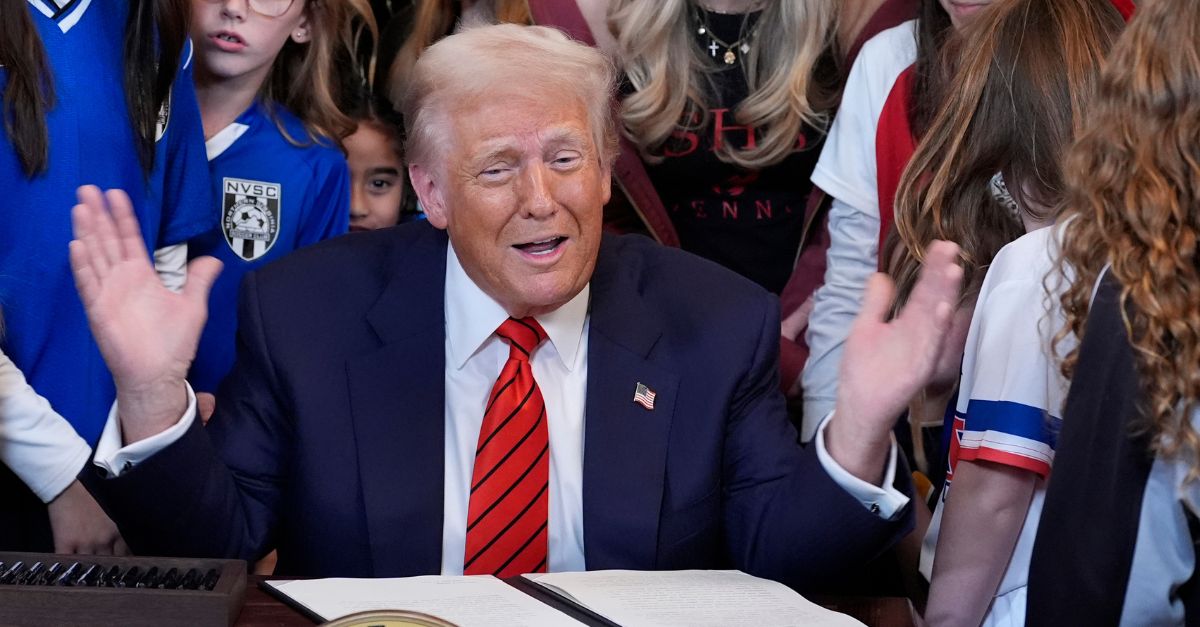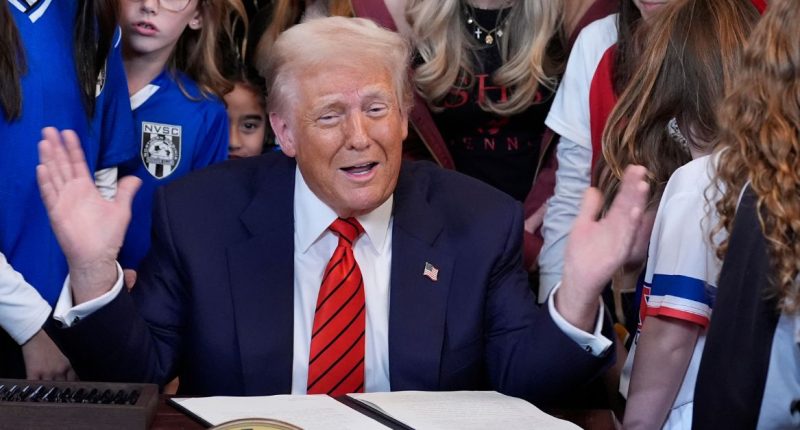
President Donald Trump signs an executive order barring transgender female athletes from competing in women’s or girls’ sporting events, in the East Room of the White House, Wednesday, Feb. 5, 2025, in Washington. (AP Photo/Alex Brandon)
The Trump administration wants the U.S. Supreme Court to scrub away a temporary restraining order (TRO) issued by a federal judge late last month that requires it to cough up nearly $2 billion in federal funds — related to contracts and grants formed by the U.S. Agency for International Development (USAID) and State Department — in what Justice Department lawyers are blasting as a “pay-or-else order.”
Organizations that had entered into contracts or received grants from the State Department and USAID are suing the Trump administration over an executive order that required a blanket freeze of all foreign aid funding, arguing that it was an unconstitutional exercise of presidential power “in contravention of congressional will” as well as an “arbitrary and capricious agency action” that will lead to starvation and the deaths of many. An emergency hearing was held last Tuesday, which led to the Supreme Court intervening by Wednesday evening after Trump requested an emergency stay.
In a Supreme Court brief, Acting Solicitor General Sarah Harris on Monday said U.S. District Judge Amir H. Ali’s ruling from last week — which required the government to fork over $2 billion by Feb. 26 — was carried out at an “emergency hearing” where no additional evidence or briefings were presented. She claimed that this led to the Trump administration doling out “fraudulent” and “improper” payments without any proof that they were needed, with there even being alleged requests for funds related to “already-completed work,” according to Harris.
“The 36-hour pay-or-else order instead arose from respondents’ contentions, on the evening of February 24, about a new emergency,” Harris said. “They insisted that the operations of several respondents and their members would not survive the week unless the government paid the amounts purportedly owed under grants or contracts for work, then demanded immediate payment on all pending requests for all aid recipients. Without asking for additional briefing or any evidence, the district court held an emergency hearing, granted that sweeping relief from the bench, and set a 36-hour clock for the government to ‘pay all invoices and letter of credit drawdown requests on all contracts for work completed prior to the entry of the Court’s TRO on February 13.””
The organizations suing believe the Trump administration should not be allowed to argue for the stay with the Supreme Court and they’ve cited a 2024 concurrent opinion from Justice Amy Coney Barrett, to emphasize the point.
“The government’s application to vacate the district court’s minute order requiring compliance with a TRO of which it has never sought review is extraordinary,” the plaintiffs said Friday. “Review of a district court’s order directing compliance in this ‘very unusual procedural posture’ is unheard of, and this Court ‘should not get into th[at] business.’”
More from Law&Crime: ‘Choked out of its very existence’: Judge fears Trump will dismantle Consumer Financial Protection Bureau completely before she can stop him
On Monday, Harris argued that there was no feasible way for the federal government to comply with the $2 billion demand in the way it’s been requested.
“The government cannot just press a button and disburse funds in response to any request that fits the district court’s description,” she said. “Instead, the government must undertake a multi-step process that complies with federal statutes before payments are authorized for disbursement.”
A three-judge panel on the D.C. appellate court declined to take up the case and Chief Justice John G. Roberts Jr. granted a government request last week for an administrative stay on Ali’s TRO, giving the full court additional time to decide on the DOJ’s request to block Ali — a Joe Biden appointee — and his order for the foreseeable future.
“Unlike the TRO, this new order does not permit the government to review the payment requests individually, or even limit itself to requests that were actually due or overdue as of February 26 at 11:59 p.m.,” Harris said Monday. “Nor would such a review even be possible on the district court’s invented timeline. Nonetheless, the State Department expedited millions of dollars in identified payments to two respondents, and USAID prioritized the processing of additional payments to other respondents.”
According to Harris, the district court “now stands on the brink” of placing USAID into a court-run receivership.
“Vacating the Feb. 25 order will not prevent them from having their requests for payments processed,” Harris noted. “Agency leadership has already represented that millions of dollars in payments from State were being issued to two of respondents for their already-completed work last week. … What respondents cannot do is leverage their individual equities into a wholesale pay-or-else order affecting untold numbers of requests, disrupting ordinary processes, and thwarting the Executive’s control of foreign-aid disbursements.”
Love true crime? Sign up for our newsletter, The Law&Crime Docket, to get the latest real-life crime stories delivered right to your inbox.






